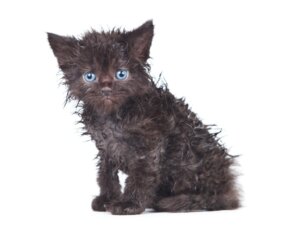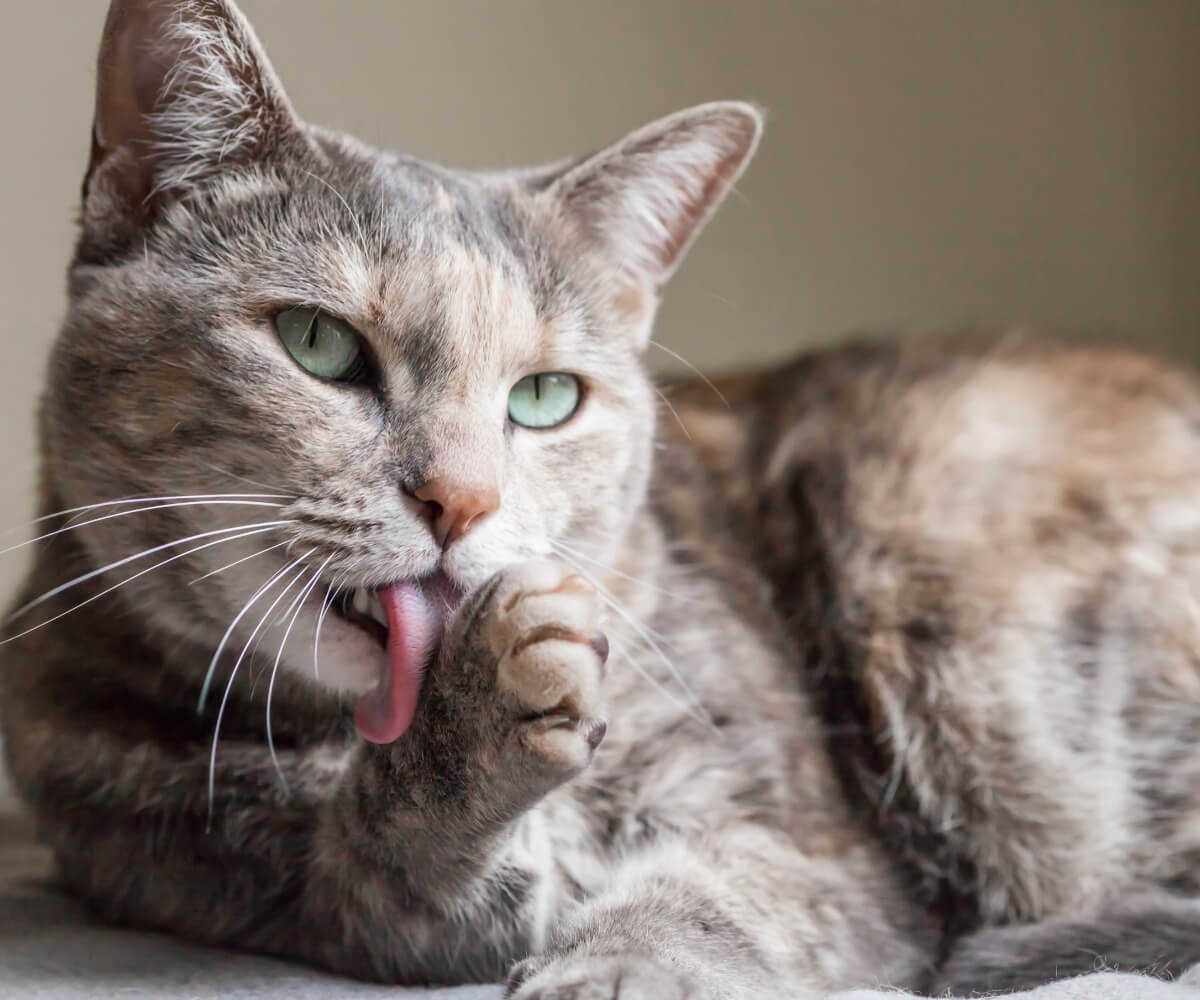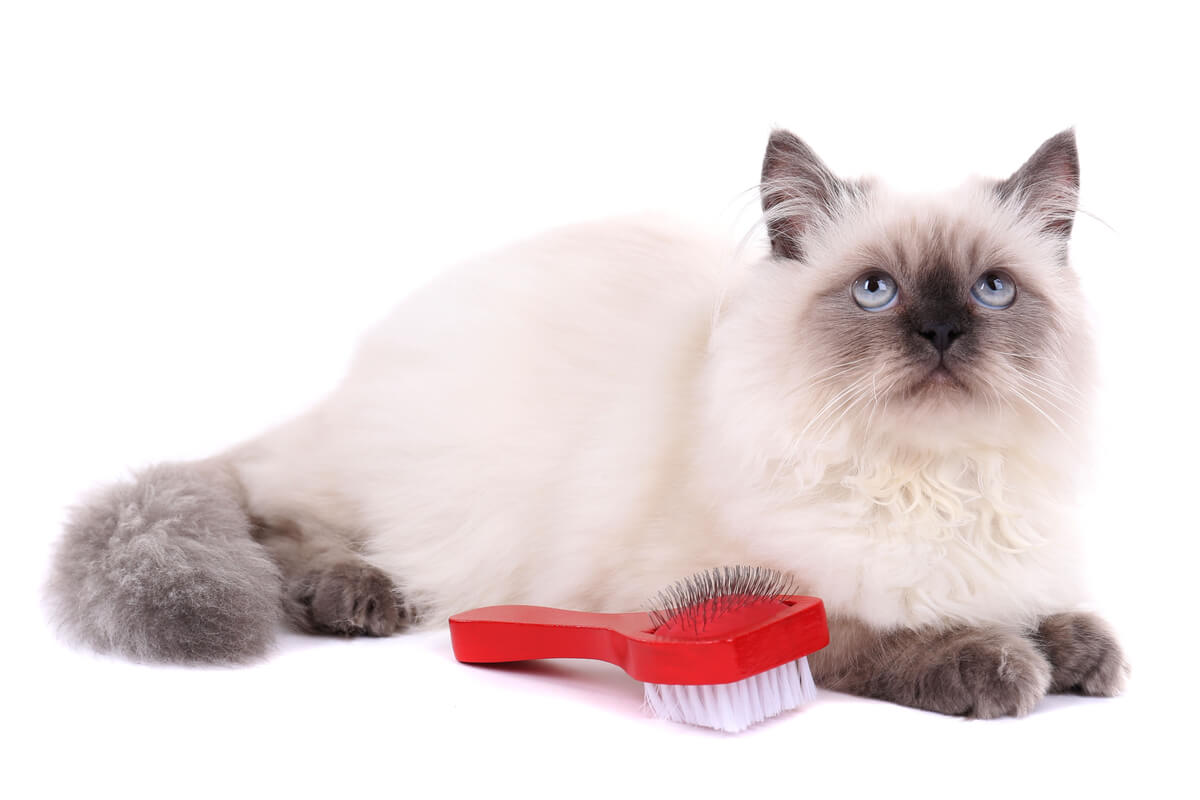My Cat Isn't Washing - What Should I Do?


Reviewed and approved by the biologist Samuel Sanchez
The grooming habits of felines are famous the world over. It’s such a part of the lives of these animals that sometimes they even wash after being caressed, as human hands can dirty or mess up their precious fur.
Cats groom themselves not only for cleaning purposes, but also to regulate their body temperature and stimulate circulation. Therefore, when a cat stops washing, then something is definitely wrong. If your pet is exhibiting this behavior, you’ll surely start to ask why your cat isn’t washing. Here we’ll suggest a number of reasons for you.
Why do cats groom themselves?
Grooming is an innate characteristic of felines, as experts say that their obsession with cleanliness begins just after birth. When they’re very small, their mothers lick them to clean them, to induce urination, to provide comfort, and to strengthen their bond. At 4 weeks of age, kittens begin grooming themselves.
The rough surface of its tongue, teeth, and comb-shaped feet make up a great grooming system that cats enjoy every day. However, they don’t just groom themselves to keep their fur clean and smooth by distributing natural oils, but for other health reasons as well. Some of them are the following:
- Regulating body temperature: The fluffing of the coat causes warm air to reach the animal’s body surface.
- Stimulating circulation: Just like combing increases blood flow to hair follicles in humans, licking stimulates superficial circulation in the outermost layers of the cat’s body.
- Refreshing: This is achieved by the evaporation of heat by saliva.
- Eliminating parasites, infections, and allergies: Mammalian saliva contains bactericidal compounds and enzymes.
Grooming your feline is absolutely necessary for its health and well-being. Therefore, if your cat isn’t washing, then it’s important for you to know why, and you’ll need to get in touch with the vet as soon as possible.
At an experimental level, it has been recorded that licking wounds in mammals facilitates healing. Therefore, it’s believed that it has properties to combat certain pathogens.

Why isn’t my cat washing?
For your cat to lick its paws is totally normal, and you need to worry when it isn’t doing it. Regular grooming helps your feline looking and feeling good, but if they get sick, they may stop cleaning.
Professionals claim that pain or illness makes any cat lose interest in grooming. For example, aging felines can suffer from arthritis, making it painful for them to maneuver their bodies for cleaning and the simple act of grooming can also tire them.
Another case can be seen in overweight cats, which have great difficulty reaching the areas they want to clean, and, when they feel frustrated by their attempts, they stop doing it. On the other hand, a cat that drools and eats less than normal usually has diseased gums, a toothache, or a tumor in the mouth, which makes grooming very uncomfortable for them.
The lifestyle change in your cat’s routine can also cause them to stop grooming due to stress. In addition, there’s also the possibility that felines separated from their mothers too soon won’t know how to clean themselves properly.
Constant stress and anxiety can cause your cat to stop grooming altogether.
How to know if my cat isn’t washing?
You can spot the signs that your cat isn’t washing very quickly. Here are some characteristics that are warning signs for lack of personal hygiene and it’s important that you pay attention to all of them:
- Rough or greasy coat
- Small mats of hair on its body or tail
- Stains on the feet due to urine or residues
- Bad smell due to lack of cleanliness
- Food particles on the face or chest half an hour after feeding
What to do to get my cat to wash?
To encourage your cat to groom itself and ease its stress, brush it every day. This is very beneficial for it, because it stimulates its skin and blood circulation, removes dead hair, and their coat will feel fresh (and also frees them from fleas and ticks).
An elderly or obese cat will greatly benefit from your help, as once they experience brushing they will likely join you in cleaning their fur. If he’s too overweight to reach its bottom or belly, pay special attention to those areas.
Some cats can become agitated when you brush or pet them, so respect their wishes and do it little by little and only when they tolerate it. Also, if you see your cat start to preen, try not to interrupt them. Now you know how important it is for its health, let them make the most of it. Once stress, pain, or weight improves, cats will regain their need for good grooming and will start to do it again.
As you can see, there are several reasons why your cat isn’t washing. However, it’s always advisable to take them to the vet immediately. Only then will you know which of the cited causes is causing this behavior and put an end to it.

Visiting the vet should be an early response, and not the last option for the problem. The vet will tell you what’s happening in your cat’s body or emotions, and they’ll provide a solution, be it a dental cleaning, medication, or a change in diet to address its weight, age, illness or a digestive problem.
The grooming habits of felines are famous the world over. It’s such a part of the lives of these animals that sometimes they even wash after being caressed, as human hands can dirty or mess up their precious fur.
Cats groom themselves not only for cleaning purposes, but also to regulate their body temperature and stimulate circulation. Therefore, when a cat stops washing, then something is definitely wrong. If your pet is exhibiting this behavior, you’ll surely start to ask why your cat isn’t washing. Here we’ll suggest a number of reasons for you.
Why do cats groom themselves?
Grooming is an innate characteristic of felines, as experts say that their obsession with cleanliness begins just after birth. When they’re very small, their mothers lick them to clean them, to induce urination, to provide comfort, and to strengthen their bond. At 4 weeks of age, kittens begin grooming themselves.
The rough surface of its tongue, teeth, and comb-shaped feet make up a great grooming system that cats enjoy every day. However, they don’t just groom themselves to keep their fur clean and smooth by distributing natural oils, but for other health reasons as well. Some of them are the following:
- Regulating body temperature: The fluffing of the coat causes warm air to reach the animal’s body surface.
- Stimulating circulation: Just like combing increases blood flow to hair follicles in humans, licking stimulates superficial circulation in the outermost layers of the cat’s body.
- Refreshing: This is achieved by the evaporation of heat by saliva.
- Eliminating parasites, infections, and allergies: Mammalian saliva contains bactericidal compounds and enzymes.
Grooming your feline is absolutely necessary for its health and well-being. Therefore, if your cat isn’t washing, then it’s important for you to know why, and you’ll need to get in touch with the vet as soon as possible.
At an experimental level, it has been recorded that licking wounds in mammals facilitates healing. Therefore, it’s believed that it has properties to combat certain pathogens.

Why isn’t my cat washing?
For your cat to lick its paws is totally normal, and you need to worry when it isn’t doing it. Regular grooming helps your feline looking and feeling good, but if they get sick, they may stop cleaning.
Professionals claim that pain or illness makes any cat lose interest in grooming. For example, aging felines can suffer from arthritis, making it painful for them to maneuver their bodies for cleaning and the simple act of grooming can also tire them.
Another case can be seen in overweight cats, which have great difficulty reaching the areas they want to clean, and, when they feel frustrated by their attempts, they stop doing it. On the other hand, a cat that drools and eats less than normal usually has diseased gums, a toothache, or a tumor in the mouth, which makes grooming very uncomfortable for them.
The lifestyle change in your cat’s routine can also cause them to stop grooming due to stress. In addition, there’s also the possibility that felines separated from their mothers too soon won’t know how to clean themselves properly.
Constant stress and anxiety can cause your cat to stop grooming altogether.
How to know if my cat isn’t washing?
You can spot the signs that your cat isn’t washing very quickly. Here are some characteristics that are warning signs for lack of personal hygiene and it’s important that you pay attention to all of them:
- Rough or greasy coat
- Small mats of hair on its body or tail
- Stains on the feet due to urine or residues
- Bad smell due to lack of cleanliness
- Food particles on the face or chest half an hour after feeding
What to do to get my cat to wash?
To encourage your cat to groom itself and ease its stress, brush it every day. This is very beneficial for it, because it stimulates its skin and blood circulation, removes dead hair, and their coat will feel fresh (and also frees them from fleas and ticks).
An elderly or obese cat will greatly benefit from your help, as once they experience brushing they will likely join you in cleaning their fur. If he’s too overweight to reach its bottom or belly, pay special attention to those areas.
Some cats can become agitated when you brush or pet them, so respect their wishes and do it little by little and only when they tolerate it. Also, if you see your cat start to preen, try not to interrupt them. Now you know how important it is for its health, let them make the most of it. Once stress, pain, or weight improves, cats will regain their need for good grooming and will start to do it again.
As you can see, there are several reasons why your cat isn’t washing. However, it’s always advisable to take them to the vet immediately. Only then will you know which of the cited causes is causing this behavior and put an end to it.

Visiting the vet should be an early response, and not the last option for the problem. The vet will tell you what’s happening in your cat’s body or emotions, and they’ll provide a solution, be it a dental cleaning, medication, or a change in diet to address its weight, age, illness or a digestive problem.
All cited sources were thoroughly reviewed by our team to ensure their quality, reliability, currency, and validity. The bibliography of this article was considered reliable and of academic or scientific accuracy.
- Animal Planet. (s. f.). Why is your cat not grooming himself? Recuperado 25 de agosto de 2021, de http://www.animalplanet.com/pets/healthy-pets/cat-not-grooming-itself/
- Colgate. (2019, 12 agosto). Why Cats Groom Themselves. Hill’s Pet Nutrition. https://www.hillspet.com/cat-care/behavior-appearance/why-cats-groom-and-lick-themselves
- Craig, T. M., Barton, C. L., Mercer, S. H., Droleskey, B. E., & Jones, L. P. (1986). Dermal leishmaniasis in a Texas cat. The American journal of tropical medicine and hygiene, 35(6), 1100-1102.
This text is provided for informational purposes only and does not replace consultation with a professional. If in doubt, consult your specialist.








